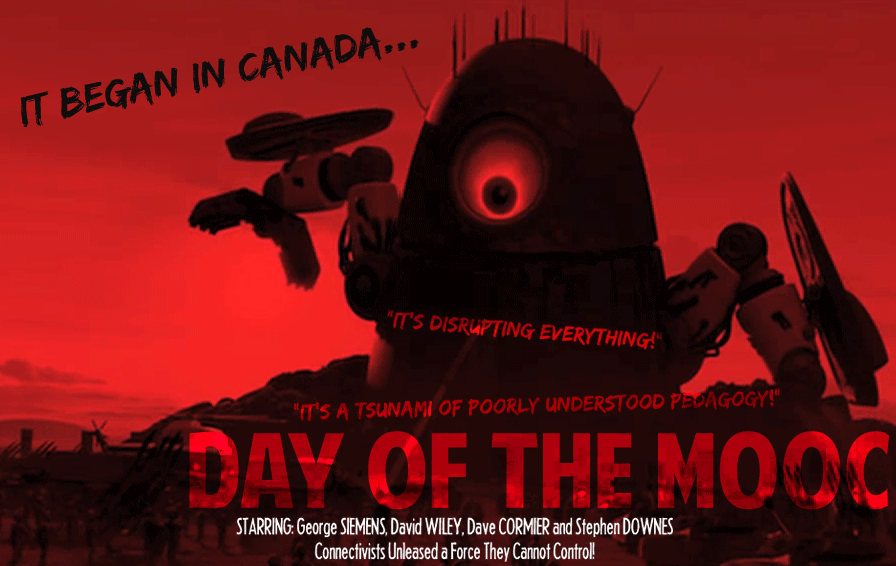
Image by David Kernohan animation by Michael Branson Smith.
I’m attending ELI 2014. MOOC seems to be synonymous with any online or blended “educational” offering regardless of size or openness.
That’s a pretty open definition.
Massive
Massive (or massively) is a strange word to ignore. It is the first letter after all. It seems important to differentiate between online courses which have lots of participants and courses which use massive participation to change course possibilities.
- If a student can’t tell1 if they’re the only student in the course or if there are 5,0002 other students, you just have an online course. Please retract your media statements before the old school online learning people burn you in effigy.
- If you take your 5,000 students and break them down so they are in “normal” sized cohorts that proceed independently, congratulations you have several online courses. Please call your mom and tell her you might have overstated your MOOC street cred.
- If having 5,000 students actually hurts your students, you have an online mess. Punish yourself by reading YouTube comments until you lose hope in humanity.
Massiveness should matter, otherwise what’s the point? It needs to be a design consideration in the course and leveraged in a way that opens possibilities, rather than an obstacle to be eliminated. You aren’t trying to duplicate a small class. You have all these people. The world could be your oyster.3 A chunk of the population will be transient. There are lots of other things that you can reasonably be sure will be true. People study that stuff. These aren’t necessarily liabilities but they will be if they are simply ignored.
Online
I can’t recall who said Gardner’s phrase “of the web, not simply on the web” is what I mean. It is amazingly simple to put stuff online.4 If you haven’t rethought things given what the Internet is — the tools, the communities, and the way information can flow . . . then you’re probably just putting stuff online.5
Open
It ought to be open. Your definition will likely vary but, as a university, I’d be hesitant of paying third party soon-to-be resellers to host that content for me. It’d be pretty easy to cut out the middleman after you’ve done all the PR work promoting their platform as the future. On the advocate side, I’d keep it actually free for long term/tail access/use/participation/reuse.
Course/Class
I have nothing useful to say here.
1 Press releases don’t count.
2 Number picked as a random big number. I’m not sure when a class moves from regular to big to massive. I imagine it depends.
3 It is open, right?
4 For evidence please see that my 86 year old grandfather has a Facebook page.
5 No. Converting your PowerPoint to Prezi does not count. I know you like the zooming but that’s not what I mean.

8 thoughts on “Suffering Massive MOOC Creep”
Comments are closed.